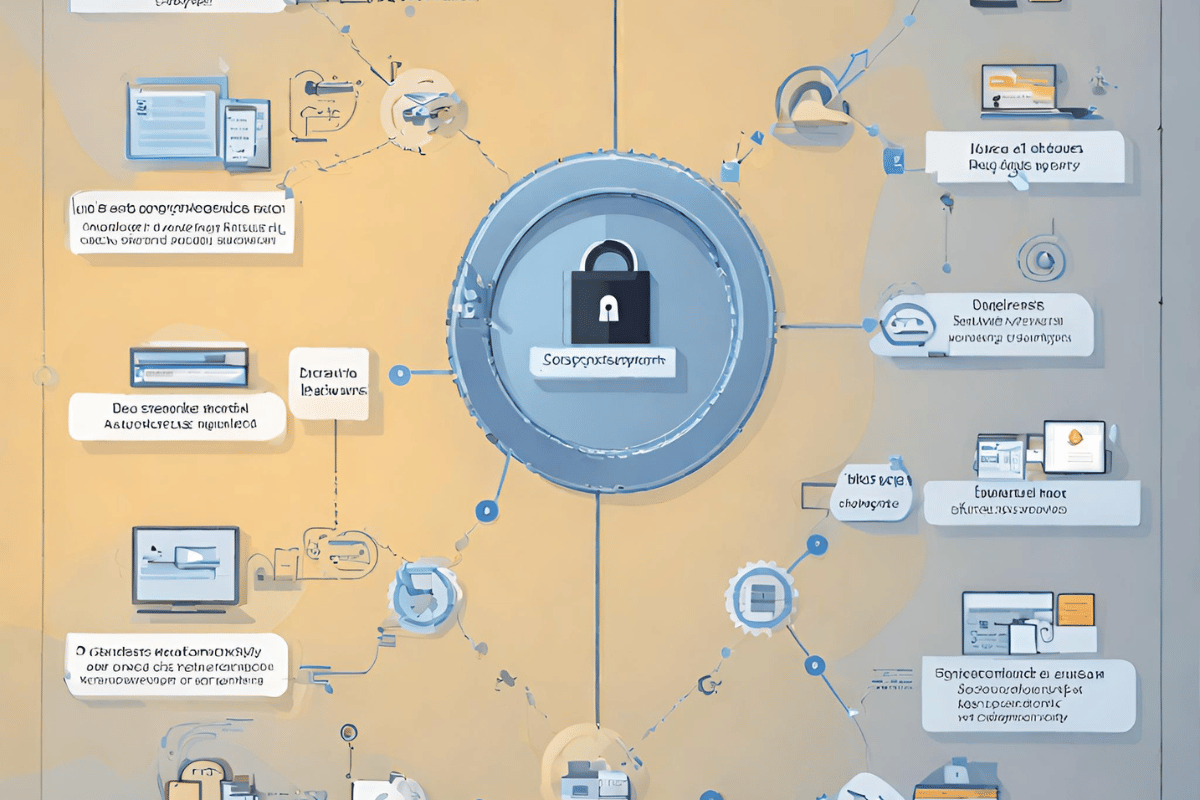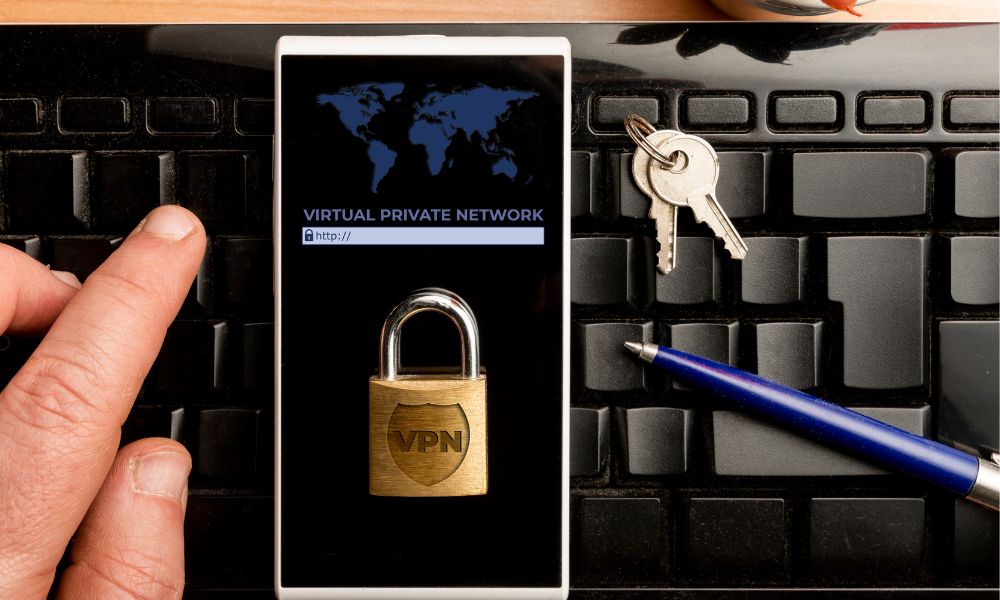Encryption is vital in our digital age. It converts data into an unreadable code, protecting our privacy and security. It safeguards online transactions, shields communication, and ensures compliance with regulations. Encryption’s applications range from secure online banking to private messaging apps. As technology evolves, encryption remains at the forefront of digital security, even against emerging threats like quantum computing. In a world where data is everything, encryption is our shield against cyber threats and a guarantee of online privacy.
What Is Encryption?

Encryption essentially converts information or data into a code to prevent unauthorized access. It involves using algorithms and cryptographic keys to scramble data in a way that can only be deciphered by someone with the correct decryption key. It’s like sending a secret message only the intended recipient can unlock.
How Encryption Works?
When you send sensitive information, such as your credit card details or personal messages, over the internet, it travels through various networks. Without encryption, this data is vulnerable to interception by cybercriminals.
However, when encryption is in place, your data is transformed into an indecipherable code before it’s transmitted. This code is so complex that even if intercepted, it’s practically impossible to decipher without the proper key. Only the recipient with the correct decryption key can unlock and access the original information.
Different Types of Encryption:
Symmetric Encryption
Symmetric or private-key encryption is one of the oldest and simplest forms. It involves using a single key to both encrypt and decrypt data. Both the sender and the recipient must have access to the same key.
How Symmetric Encryption Works?
- The sender uses a symmetric key to encrypt the data.
- The encrypted data is transmitted to the recipient.
- The recipient uses the same symmetric key to decrypt the data.
2. Asymmetric Encryption
Asymmetric encryption, also known as public-key encryption, uses a pair of keys: public and private. The public key is freely shared, while the private key is kept secret. Data encrypted with one key can only be decrypted with the other key in the pair.
How does Asymmetric Encryption Work?
- The sender uses the recipient’s public key to encrypt the data.
- The encrypted data can only be decrypted using the recipient’s private key.
3. Hybrid Encryption
Hybrid encryption combines the strengths of both symmetric and asymmetric encryption. It is a commonly used method for secure data transmission in various applications, including secure email and online banking.
How Hybrid Encryption Works?
- The sender generates a random symmetric key for the data.
- The data is encrypted using the symmetric key.
- The recipient’s public key is used to encrypt the symmetric key.
- The recipient uses their private key to decrypt the symmetric key and then uses it to decrypt the data.
4. End-to-End Encryption
End-to-end encryption is a method that ensures only the sender and the intended recipient can read the message. It is commonly used in messaging apps like WhatsApp and Signal.
How does End-to-End Encryption Work?
- Messages are encrypted on the sender’s device using the recipient’s public key (if using asymmetric encryption) or a shared symmetric key (if using hybrid encryption).
- Encrypted messages are transmitted to the recipient.
- The recipient decrypts the messages using their private key (if using asymmetric encryption) or the shared symmetric key.
Protecting Your Privacy
Encryption safeguards our personal information, such as Social Security numbers, health records, and financial details. In the wrong hands, this data can lead to identity theft, financial fraud, and other forms of cybercrime.
2. Secure Communication
When we communicate through encrypted channels, like secure messaging apps or encrypted email services, our conversations remain private. This ensures that sensitive discussions, whether personal or business-related, are shielded from eavesdroppers.
For businesses, encryption is a crucial line of defense against data breaches. It helps protect customer data and prevents costly and reputation-damaging security incidents.
Protection Against Cyberattacks:
Ransomware Attacks

Ransomware encrypts your files and demands a ransom for their release. Proper data encryption can thwart these attacks by making it nearly impossible for hackers to decrypt and exploit your files.
Hackers target databases containing personal information, but encryption can render this stolen data useless. Even if they breach a system, the encrypted data remains a puzzle without the decryption key.
Protecting Intellectual Property
Encryption helps safeguard patents, trade secrets, and other proprietary information.
Competitive Advantage
Companies that invest in encryption demonstrate their commitment to protecting sensitive information. This can be a competitive advantage, as customers are more likely to trust businesses that take data security seriously.
Personal Intellectual Property
Individuals can also benefit from encryption to protect their creative work, such as manuscripts, music compositions, or business plans. This ensures that their ideas remain confidential until they choose to share them.
Everyday Applications of Encryption:
Secure Online Banking
Encryption shields your login credentials and financial data from prying eyes when you log in to your online banking account. This keeps your money safe and your financial transactions confidential.
Safe Online Shopping
Encryption is why you can confidently enter your credit card details when making online purchases. It encrypts your payment information, making it virtually impossible for cybercriminals to intercept and misuse it.
Protected Healthcare Information
Encryption is crucial for safeguarding patients’ medical records and personal information in the healthcare sector. It ensures that sensitive data remains confidential and compliant with healthcare privacy laws.
Encrypted Messaging Apps
Messaging apps like WhatsApp and Signal use end-to-end encryption to secure your messages and calls. This means that only you and the recipient can access the content of your conversations.
VPNs for Online Privacy

Virtual Private Networks (VPNs) employ encryption to create secure tunnels for your internet traffic. This shields your online activities from prying eyes, ensuring your browsing remains private.
The Future of Encryption:
Quantum Computing and Post-Quantum Encryption
Quantum computing, still in its infancy, has the potential to disrupt current encryption methods. Quantum computers use quantum bits or qubits to perform complex calculations exponentially faster than classical computers. This means that traditional encryption algorithms, which rely on the difficulty of factoring large numbers, may become vulnerable to quantum attacks.
Homomorphic Encryption
Homomorphic encryption is a cutting-edge encryption technique that allows computation on encrypted data without decrypting it. This innovation opens up possibilities for secure data analysis and computation in privacy-sensitive fields like healthcare and finance. With homomorphic encryption, data can remain encrypted while computations are performed, preserving privacy.
Blockchain and Encryption
Blockchain technology, known for its role in cryptocurrencies like Bitcoin, relies heavily on encryption for security. Transactions and data stored on a blockchain are encrypted, ensuring tamper-proof and transparent record-keeping.
The application of blockchain extends beyond cryptocurrencies. It is increasingly used in supply chain management, voting systems, and digital identity verification, where encryption is pivotal in securing sensitive data and transactions.
Cloud Encryption
Cloud encryption involves encrypting data before it is uploaded to the cloud, ensuring that even cloud service providers cannot access the plaintext data.
Cloud encryption will likely become more sophisticated, incorporating features like zero-knowledge proofs and multi-party computation to enhance data security in cloud environments.
The Internet of Things (IoT) and Encryption
As the IoT expands, encryption will play a vital role in securing the vast network of interconnected devices. Encryption ensures that data transmitted between IoT devices remains confidential and prevents unauthorized access.
Future encryption solutions for IoT will need to strike a balance between strong security and the resource constraints of IoT devices. Lightweight encryption algorithms and efficient key management will be essential.
Conclusion
The world of encryption is a vast and multifaceted landscape, with various methods and techniques designed to keep our digital world secure. From the simplicity of symmetric encryption to the complexity of hybrid and asymmetric encryption, each type serves a specific purpose, addressing unique security challenges. Whether it’s protecting sensitive messages, securing online transactions, or ensuring data remains confidential at rest, encryption is the guardian of our digital privacy and security. It’s a tool that empowers individuals, organizations, and even entire industries to communicate and transact with confidence in an increasingly interconnected world.
Frequently Asked Questions (FAQs)
1. Is encryption the same as password protection?
No, encryption and password protection are different. Encryption converts data into an unreadable format, while password protection restricts access to a file or device with a password.
2. Can encryption be broken?
While encryption can be incredibly secure, it is always theoretically possible to break it with advanced computing power. However, modern encryption methods are designed to withstand even the most determined attacks.
3. Do I need to be tech-savvy to use encryption?
No, many user-friendly applications and services incorporate encryption without requiring users to have technical expertise. Encrypting your data can be as simple as enabling a setting on your smartphone or computer.
4. Is encryption legal everywhere?
Encryption is legal in most countries and is encouraged for data protection. However, some nations may impose restrictions or regulations on encryption technologies, so it’s essential to be aware of local laws.
5. Can I recover encrypted data if I forget the decryption key?
No, if you forget the decryption key for your encrypted data, it becomes nearly impossible to recover. That’s why it’s essential to keep your decryption keys secure and accessible only to authorized individuals.
